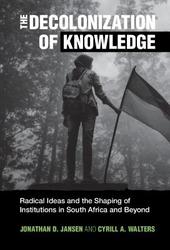
|
The Decolonization of Knowledge: Radical Ideas and the Shaping of Institutions in South Africa and Beyond
Hardback
Main Details
| Title |
The Decolonization of Knowledge: Radical Ideas and the Shaping of Institutions in South Africa and Beyond
|
| Authors and Contributors |
By (author) Jonathan D. Jansen
|
|
By (author) Cyrill A. Walters
|
| Physical Properties |
| Format:Hardback | | Pages:272 | | Dimensions(mm): Height 235,Width 159 |
|
| Category/Genre | African history
National liberation, independence and post-colonialism |
|---|
| ISBN/Barcode |
9781316514184
|
| Classifications | Dewey:378.68 |
|---|
| Audience | |
|---|
| Illustrations |
Worked examples or Exercises
|
|
Publishing Details |
| Publisher |
Cambridge University Press
|
| Imprint |
Cambridge University Press
|
| NZ Release Date |
28 February 2023 |
| Publication Country |
United Kingdom
|
Description
In 2015, students at the University of Cape Town used the slogan #RhodesMustFall to demand that a monument of Cecil John Rhodes, the empire builder of British South Africa, be removed from the university campus. Soon students at Oxford University called for the removal of a statue of Rhodes from Oriel College. The radical idea of decolonization at the forefront of these student protests continues to be a key element in South African educational institutions as well as those in Europe and North America. This book explores the uptake of decolonization in the institutional curriculum, given the political demands for decolonization on South African campuses, and the generally positive reception of the idea by university leaders. Based on interviews with more than two hundred academic teachers at ten universities, this is an innovative account of how institutions have engaged with, subverted, and transformed the decolonization movement since #RhodesMustFall.
Author Biography
Jonathan Jansen is Distinguished Professor of Education at Stellenbosch University and President of the Academy of Science of South Africa. He is a curriculum theorist, and his research is concerned with the politics of knowledge. His recent publications include Fault Lines: A Primer on Race, Science and Society (2020), Learning under Lockdown: Voices of South Africa's Children (2020), and Learning Lessons (2021). Cyrill Walters is a Research Fellow in Higher Education at Stellenbosch University. She also teaches on the MBA programme at Stellenbosch University Business School. She is currently engaged in projects examining decolonization within South African universities, the intersection of race and gender in higher education, and complexity theories in leadership.
Reviews'This is an exceptional contribution to our understanding of what actually happens to challenging curriculum ideas in higher education. Politically wise and clearly written, this volume deserves a wide audience among all of those who care about creating a more socially and culturally responsive education.' Michael W. Apple, University of Wisconsin 'The movement to 'decolonize' South African universities has produced far more heat than light. In this sober, brave, deeply empathetic book, Jansen and Walters look beyond the slogans and posturing to illuminate not only the failings but also the achievements and possibilities of the struggle for radical educational change.' James T. Campbell, Stanford University 'This theoretically contextualized investigation situates the problem of doing radical curriculum transformation within the dynamics of institutional intransigence, biographies of academic innovators, and the struggle for epistemic justice. It has profound intellectual and practical significance for academics and activists in South Africa and beyond.' Joyce King, Georgia State University 'This book sheds new light on how we understand reform, the ideas that inform it, the path those ideas follow, and implementation. The notion of an institutional curriculum could allow real transformation. This is a book for institutional leaders and the broader community to learn from and inform their reform projects.' Teboho Moja, New York University 'Easy to understand and entertaining, this book informs, theorises, and unpacks some of the knottiest issues in higher education. Its complex arguments about decolonisation and curriculum revision will reach and benefit a wide readership in (South) Africa and beyond, including academics and non-experts. A refreshing achievement!' Chika C. Mba, University of Ghana
|